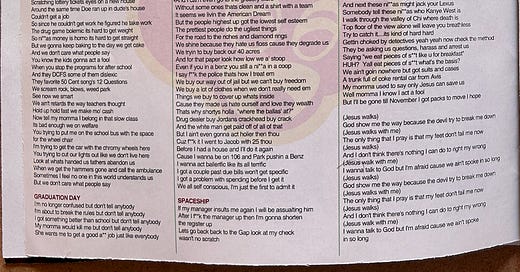Always Bet on West: The College Dropout at 20 & Counting
By: Antonio Jenkins
Kanye West’s 2004 debut album The College Dropout made way for Late Registration and Graduation. I own physical copies of all three albums, bought on or near the release dates, which was also a first for me at the time. Though all three are encompassed in this idea of navigating from the inception of the college experience to the finish line, The College Dropout is the musical equivalent to its cinematic kin, School Daze, Higher Learning, and TV’s A Different World. All are reflections and artistic interpretations of Black collegiate life, whether HBCU or PWI. While the visual representations are heavy-handed at times, West uses a lyrical playfulness, even with weighty subjects (including his near fatal car crash) to make an album that reflects about the good times of his own short-lived campus life.
On a personal level, I believe The College Dropout was West artistically asking and answering the question, “Who do you serve: Yourself or the institution?” Shown from the song lyrics, serving the institution is noble, good, and at times rewarded, but this is not always the case. For West, this includes higher education, the church, and the music business itself.
The opening songs of TCD situates Kanye with an opportunity to write and direct the campus choir for graduation, a moment to showcase presumably the talented Black student voices to uplift everyone's spirits as well as open donor wallets. Instead of creating the feel good song, West proceeds to reflect on how his college experience is disconnected from his world view, as well as how the college seeks to mold him and other Black folks into this universal idea of Black and highly educated while profiting from his talent and time when he has few opportunities to make money from his own work, particularly as an artist and entrepreneur.
Kanye’s critique of education is that it is not community or student centered, but self-centered, and takes issue when called out on missing opportunities to be expansive or exclusive. This is a very interesting read as colleges and universities spent most of the first decade of the 2000s building Black Male Initiatives to boost enrollment and graduation rates.
West does another critique of institutions in a versus between the church and hip hop music. Hip-hop as an ever evolving artform, still draws from traditional Black music(Blues and Soul), and particularly the Black Christian experience. However, when the reverse happens, and Black Christian/Gospel pulls from Hip-hop to reach larger, wider, and younger audiences, it pulls everything except what is deemed secular, over. hip-hop and RnB artists, over time, have accommodated Black Churches by sanitizing songs or entire albums as an offering.
What Kanye offered on The College Dropout was his version of a Black Christian experience with no stripping or sanitizing (Jesus Walks, Two Words) of explicit language or story lines. Beyond the Walmarted version with missing words, Gospel musicians took this offering and did their own versions sans Kanye’s lyrics (i.e. his experience, his truth). Does the music carry the same weight without the connection to the lyrics/artist if the impact is made based on the original version?
In retrospect, during the summer of 2004, everyone was talking about Kanye when another guy with a funny name came into the spotlight on the national stage: Barack Obama. Like Kanye, Obama transplanted to Chicago, and made the city his home after finishing college and law school. Before making his speech at the Democratic National Convention, the then state senator was probably best known as the guy with a funny name that lost an election to a man named Bobby Rush, who I bet, since then, has had the actual blues legend play for a campaign stop or two.
Even after the loss where Obama took the risk, he was told to wait his turn, get in line and work his way up the ladder. Obama raised his profile so high, the Republicans had to find someone outside the state to run against him because he started cooking so hard that summer they couldn’t beat him. If anything, The College Dropout is the soundtrack of 2004 and the emergence of Barack Obama.
The College Dropout is a timestamp of a world that really didn't know the expansiveness of Kanye West or that Obama was on his way to becoming President. It was also before severe natural disasters, drastic climate change, BLM, and a global pandemic. At face value, The College Dropout could very well be a wonderful articulation of West finding his way outside of a college classroom, something that colleges now seem to offer as part of a curriculum known as a gap year or at the very least, a much more socially acceptable alternative. And with a closer look, I’d say The College Dropout is a long-form opinion piece that questions society, institutions, and the self. Deeper still, it could be the album that Obama listened to when he got cooked by Rep. Bobby Rush, but still dreaming nonetheless, worked his way to the DNC Convention and on to the presidency four years later. Or, it's just good music.
This essay was penned by Antonio Jenkins.





